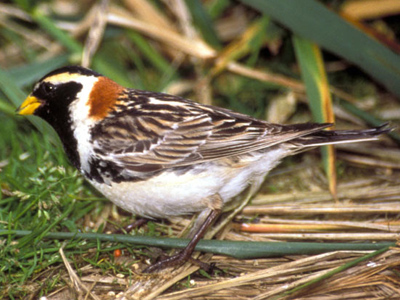
Ask the AI Tutor
Need help with British Birds - Buntings, Sparrows and Starlings? Ask our AI Tutor!
AI Tutor - Lucy
Connecting with Tutor...
Please wait while we establish connection

What is the name of this bird?
British Birds - Buntings, Sparrows and Starlings
The buntings of Europe, Asia and Africa are related to American sparrows. Most have simple, unmusical but distinctive songs. Starlings look black at a distance but when seen closer they are very glossy with a sheen of purples and greens. Test your knowledge in the following Natural History quiz on buntings, sparrows and starlings.
To see a larger image, click on the picture.
1 .
What is the name of this bird?
Lapland Bunting
Reed Bunting
Cirl Bunting
House Sparrow
- Group: Buntings and American Sparrows
- Binomial: Emberiza cirlus
- Order: Passeriformes
- Family: Emberizidae
- Status: Resident Breeding Species
- Best looked for in fields and hedges of south Devon.
- Through the efforts of conservation organisations and landowners, the population increased from 118 pairs in 1989 to 700 pairs in 2003.
2 .
What is the name of this bird?
Cirl Bunting
Reed Bunting
House Sparrow
Yellowhammer
- Group: Sparrows
- Binomial: Passer domesticus
- Order: Passeriformes
- Family: Passeridae
- Status: Resident Breeding Species
- Once common throughout the UK but now in decline in many areas
- The size of the black bib determines the bird's dominance within its community
- It is normally found wherever there is a concentration of people
3 .
What is the name of this bird?
Yellowhammer
Common Starling
Reed Bunting
Dunnock
- Group: Starlings
- Binomial: Sturnus vulgaris
- Order: Passeriformes
- Family: Sturnidae
- Status: Resident Breeding Species And Winter Visitor
- The base of their bills are blue for boys and pink for girls!
- In the autumn massive flocks congregate in what are known as "murmurations"
4 .
What is the name of this bird?
Common Starling
House Sparrow
Dunnock
Reed Bunting
- Group: Buntings and American Sparrows
- Binomial: Emberiza schoeniclus
- Order: Passeriformes
- Family: Emberizidae
- Status: Resident Breeding Species
- Usually delivers its song from a perch at the top of a tree or bush.
- The nest is a cup of grass and moss built on the ground.
- Fine grasses and hair are used to line the cup.
5 .
What is the name of this bird?
Snow Bunting
Corn Bunting
Dunnock
Eurasian Tree Sparrow
- Group: Buntings and American Sparrows
- Binomial: Miliaria calandra
- Order: Passeriformes
- Family: Emberizidae
- Status: Resident Breeding Species
- The song of the male is a repetitive metallic sound, usually likened to jangling keys.
- Males play only a small role in parental care; they only feed the chicks when they are over half grown.
6 .
What is the name of this bird?
House Sparrow
Common Starling
Eurasian Tree Sparrow
Lapland Bunting
- Group: Sparrows
- Binomial: Passer montanus
- Order: Passeriformes
- Family: Passeridae
- Status: Resident Breeding Species
- The UK population has suffered a severe decline, estimated at 93 per cent between 1970 and 2008.
- Untidy nest usually built in a natural cavity.
- Shy and not associated with man.
7 .
What is the name of this bird?
Yellowhammer
Common Starling
Lapland Bunting
House Sparrow
- Group: Buntings and American Sparrows
- Binomial: Emberiza citrinella
- Order: Passeriformes
- Family: Emberizidae
- Status: Resident Breeding Species
- Common in all sorts of open areas.
- Often seen perched on top of a hedge or bush, singing its high-pitched song.
- The familiar song of the male is often described as 'A little bit of bread and no cheese'.
8 .
What is the name of this bird?
Eurasian Tree Sparrow
Common Starling
House Sparrow
Snow Bunting
- Group: Buntings and American Sparrows
- Binomial: Plectrophenax nivalis
- Order: Passeriformes
- Family: Emberizidae
- Status: Winter Visitor
- Globally breed around the arctic from Scandinavia to Alaska, Canada and Greenland and migrate south in winter.
- During the last ice age, it was widespread throughout continental Europe.
9 .
What is the name of this bird?
Reed Bunting
Eurasian Tree Sparrow
Lapland Bunting
Dunnock
- Group: Buntings and American Sparrows
- Binomial: Calcarius lapponicus
- Order: Passeriformes
- Family: Emberizidae
- Status: Winter Visitor
- Spends most of its time on the ground and often seen in small flocks.
- Wintering birds are mainly found along the east coast of the UK.
- Yorkshire, Lincolnshire and North Norfolk coasts usually hold the most birds.
10 .
What is the name of this bird?
Dunnock
Snow Bunting
Lapland Bunting
Common Starling
- Group: Accentors
- Binomial: Prunella modularis
- Order: Passeriformes
- Family: Prunellidae
- Status: Resident Breeding Species
- Also known as Hedge Sparrow
- Intricate light and dark brown markings
- Adults have some grey on their heads but this is absent in young birds
- Its movements are altogether more agitated than house sparrows
**Unlimited Quizzes Await You! 🚀**
Hey there, quiz champ! 🌟 You've already tackled today's free questions.
Ready for more?
Ready for more?
🔓 Unlock UNLIMITED Quizzes and challenge yourself every day. But that's
not all...
not all...
🔥 As a Subscriber you can join our thrilling "Daily Streak" against other
quizzers. Try to win a coveted spot on our Hall of Fame Page.
quizzers. Try to win a coveted spot on our Hall of Fame Page.
Don't miss out! Join us now and keep the fun rolling. 🎉
**Unlimited Quizzes Await You! 🚀**
Hey there, quiz champ! 🌟 You've already tackled today's free questions. Ready for more?
🔓 Unlock UNLIMITED Quizzes and challenge yourself every day. But that's not all...
🔥 As a Subscriber you can join our thrilling "Daily Streak" against other quizzers. Try to win a coveted spot on our Hall of Fame Page.
Don't miss out! Join us now and keep the fun rolling. 🎉
















